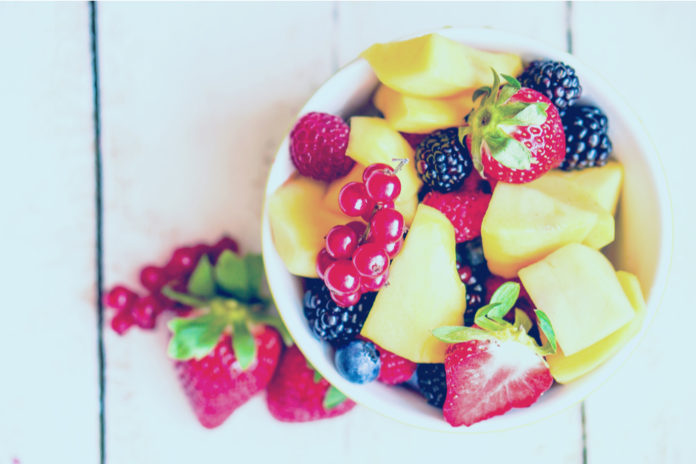Also known as “keto,” the ketogenic diet has become increasingly popular amongst dieters in hopes to lose weight.
Keto is a very high-fat, low-carb diet. About 75 to 80 percent of daily calories come from fat. This often equates to eating 50 grams or less of carbs per day.
The drastic reduction of carb intake puts the body into a metabolic state known as ketosis. This is a process in which the body produces ketones from body fat, using them as energy.
With the amount of carbs limited to stay in ketosis, people often wonder if you can eat fruit on keto. But fruits offer valuable nutrients that can lead to numerous health benefits.
So rather than avoiding “nature’s candy” altogether, incorporate these low-carb fruits into a keto meal plan.
Keto-Friendly Fruit List
The keto fruit list below ranks carbs from the lowest to the highest. Carb content is also valued in grams and based on a 100-gram (g) serving size.
1. Tomatoes
Carb content: 3.89 g
Whether believed as a fruit or vegetable, tomatoes are keto regardless.
In addition to being low in carb, tomatoes are well-known for their lycopene content. Lycopene is carotenoid that gifts tomatoes their color and a powerful antioxidant that may protect against a variety of chronic diseases.
Enjoy various types of tomatoes, including cherry tomatoes and plum tomatoes. Just beware of tomato products, such as soups and sauces, often laden in sugar.
2. Olives
Carb content: 6.06 g
Like avocados, olives are a unique fruit growing from the olive tree.
They are low in carbs while being rich in healthy fat, which is why they are extracted to produce olive oil.
Olives tend to be salty, too, which is important on a keto diet to fight the “keto flu.”
3. Watermelons
Carb content: 7.55 g
Watermelon is keto-friendly mostly in part to its high water content, which leaves small room for carbs to take over. And being 91 percent water, the luscious fruit is a valuable hydration source.
Watermelon contains lycopene like tomatoes, which gives the fruit its vibrant color. It is also rich in citrulline, vitamins C and A, pantothenic acid, copper, potassium, and biotin.
4. Berries
Carb content for strawberries: 7.68 g
Berries are one of the lowest carb fruits in terms of net carbs, which is total carbs minus the fiber content. The remaining grams of net carbs are more likely to be absorbed and likewise impact ketosis.
Not only are berries a low carbohydrate fruit, but they are packed with antioxidants. They are also rich in fiber, vitamin C, potassium, and folate.
Some of the best berries to include in a keto meal plan include strawberries, blueberries, blackberries, and raspberries.
5. Avocados
Carb content: 7.82 g
Avocado is one of the most, if not the most, unique fruits to grace itself in the diet.
Unlike most fruits, avocados offer monounsaturated fat, a recognized “healthy” fat shown to protect against heart disease.
Avocados are ample in fiber and potassium to support digestive and heart health, respectively. The unique fruit is also rich in folate, copper, and vitamins B6, C, E, and K.
6. Pink Grapefruits
Carb content: 8.08 g
Citrusy, sour, and sweet… The trifecta of flavor grapefruit delivers is sought out by many.
The citrus fruit boasts antioxidants, largely in the form of phytochemicals. The powerful antioxidants paired with grapefruit’s potassium and fiber content can help maintain a healthy heart.
7. Cantaloupes
Carb content: 8.16 g
Cantaloupe is a low-carb, high-water summer favorite much like watermelon.
The fruit is packed with beneficial nutrients, including beta carotene, copper, folate, potassium, and vitamin C.
8. Honeydews
Carb content: 9.09 g
The juicy honeydew melon obtains its name from its reminiscent flavor when fully ripe, offering subtle tones of honey.
But do not let the thought of sugary, sweet honey turn you away, as honeydew is a low-carbohydrate fruit. Honeydew offers folate, potassium, magnesium, and vitamins B6, C, and K.
9. Lemons
Carb content: 9.32 g
While biting into a lemon may not be ideal to all, the juice and zest are perfect pairings to many recipes.
Lemon juice can likewise flavor unsweetened and plain beverages, including a refreshing glass of water or tea.
10. Peaches
Carb content: 9.54 g
The fuzzy, low-carb fruit is valuable for its rich and succulent taste and texture. The nutrients peaches supply, including vitamins A and C, can also promote healthy skin and hair.
Peaches pair well with a number of foods, including yogurt and cottage cheese.
11. Oranges
Carb content: 11.75 g
Orange you glad this is a low-carb fruit?
This juicy, citrusy fruit bursts with vitamin C, an antioxidant that can help boost the immune system and ward off colds.
Add a touch of flavor to recipes by using a touch of the juice and zest.
12. Apples
Carb content: 13.81 g
Apples are highly appreciated related to their fiber content. They offer both soluble and insoluble fiber forms, ultimately promoting good heart and digestive health and potential weight loss.
They also contain significant amounts of vitamin C and potassium along with other plant components including quercetin, catechin, and phlorizin.
13. Guavas
Carb content: 14.32 grams
Though this tropical, low-carb fruit may not be as common as the others, guavas certainly deserve some recognition! Guavas boast in fiber, potassium, folate, and vitamins A and C.
The flesh of guavas offers a soft, sweet, and tangy characteristics when ripe.
14. Kiwis
Carb content: 14.66 g
The kiwi fruit is low in carbs but packed full of nutrients, including fiber, potassium, and vitamins C, E, and K.
Kiwis are also one of the best foods to eat before bed. They may improve sleep onset, duration, and efficiency in adults with self-reported sleep disturbances.
15. Coconuts
Carb content: 15.2 g
Like avocados, coconuts are lower carb and higher fat fruits.
Just beware of some coconut varieties, as sugar is often added. Look for an unsweetened product or scoop the meat out from the coconut itself.






